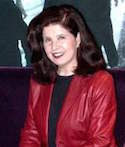“Andrew
Carnegie loved libraries; he knew their importance to an educated society and
as anchors to our communities. And so, just as some loyal baseball fans travel
to attend games at all 30 major league stadiums, over the last decade or so, I
have slowly, casually, visited Carnegie libraries whenever I am on the road.” – Sam Weller
An unabashed supporter of our public libraries, Weller won acclaim for his biographical works on fellow writer Ray Bradbury. Among his writings about Bradbury, the
renowned Fantasy and Science Fiction writer, are The Bradbury Chronicles:
The Life of Ray Bradbury and Listen to the Echoes, The Ray Bradbury
Interviews, a collection of interviews, photos, mementos, and artifacts.
A journalist before he started
writing short stories and biographies, Weller is a native of Lake Forest, IL,
born on this date in 1967. The one-time
Midwest correspondent for Publishers Weekly, he also has written for The
Paris Review, All Things Considered, Slate Magazine, and The
Huffington Post. His short fiction
has appeared in numerous anthologies, literary journals and magazines, and he
teaches creative writing at Columbia College in Chicago. 

His recommendation for every writer's success is to spend time within the halls of your local library. “Browsing for books with a mouse and screen
is not nearly as joyful an act as wandering the stacks and getting lost in the
labyrinthine corridors of knowledge,” he said.
“The best libraries are places of imagination, education and community.
The best libraries have mystery to them.”
Share A Writer’s Moment with a friend by clicking the g+1 button below.















